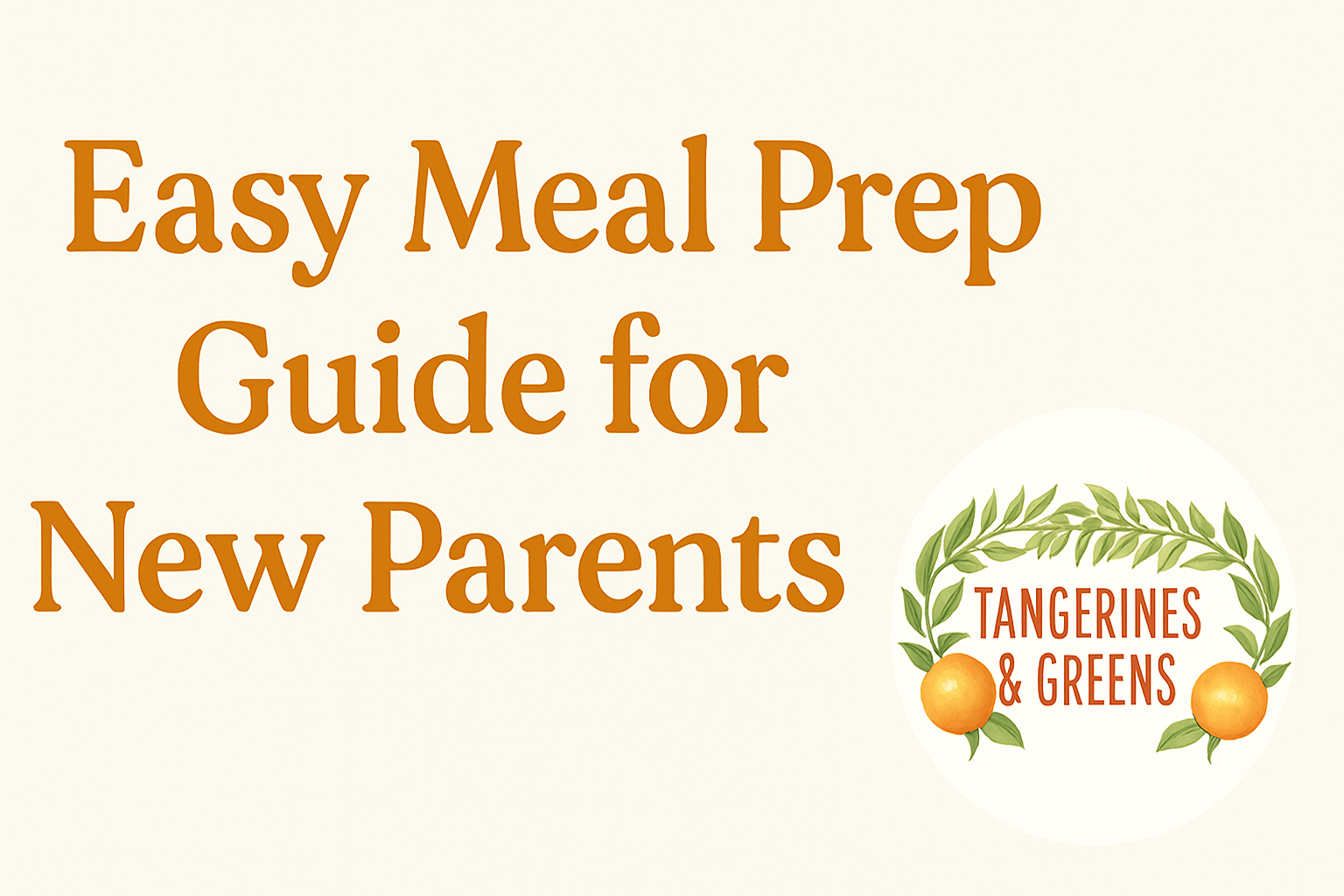Practical meal prep strategies to help new parents save time, money, and stress while keeping the whole family well-fed with nutritious meals.
Life with a newborn means everything changes—including your ability to cook regular meals. Between feedings, diaper changes, and catching sleep when you can, preparing healthy food often feels impossible. That’s where smart meal prep becomes your secret weapon for surviving those early parenting months while keeping everyone in your family well-nourished.
Why Meal Prep is Essential for New Parents
Becoming a parent is one of the most joyful and overwhelming transitions in life. Amid the sleepless nights, endless diaper changes, and constant feedings, it’s easy to let basic needs—like eating balanced meals—slip through the cracks. That’s where meal prep comes in. More than a convenience, it’s a form of self-care and a strategy for survival in the early months of parenthood.
Here’s why meal prep should be part of your postpartum plan:
Save Precious Time
Time becomes your most valuable resource when you’re caring for a newborn. With just a few hours of prep on the weekend—or even in short bursts throughout the week—you can free up mental space and time during those hectic weekdays. Pre-chopped veggies, batch-cooked proteins, and grab-and-go snacks mean fewer last-minute scrambles or costly takeout orders.
Reduce Decision Fatigue
When you’re sleep-deprived and overwhelmed, even small decisions can feel like mountains. Having meals planned and ready to go eliminates the “What’s for dinner?” dilemma at 6 PM, allowing you to preserve your mental energy for more important things—like soothing a fussy baby or taking a much-needed nap.
Stay Nourished
You can’t pour from an empty cup. Good nutrition helps your body recover postpartum, supports breastfeeding (if applicable), and keeps your energy and mood stable. Meal prep allows you to intentionally include nutrient-dense foods—like lean proteins, whole grains, and colorful produce—so you’re not relying on cereal or crackers to get through the day.
Cut Grocery Costs and Reduce Waste
Planning ahead makes grocery shopping more efficient and cost-effective. You’ll avoid impulse purchases, reduce the likelihood of food spoiling in the fridge, and make the most of what you already have on hand. Over time, this can add up to significant savings—a welcome relief in the face of new baby expenses.
Ensure You Actually Eat
It’s surprisingly easy for new parents to forget to eat or to delay meals for hours. Meal prep gives you quick access to ready-made options, making it more likely that you’ll eat regular meals and snacks—even during cluster feeding sessions or nap time
Start Simple: Basic Meal Prep Containers and Storage
You don’t need fancy equipment to succeed at meal prep as a parent. Focus on practical solutions that make your life easier.
Container Essentials for Parent Life
Glass containers are worth the investment because they:
- Won’t absorb odors from reheated leftovers
- Are microwave and dishwasher safe
- Stack neatly to save refrigerator space
- Won’t stain from tomato-based sauces
Practical tip: Choose containers with easy-open lids you can manage one-handed when holding your baby.
Mason jars are perfect for:
- Overnight oats for quick breakfasts
- Salads with dressing on the bottom
- Smoothie ingredients ready to blend
- Snack portions of nuts or cut fruit
Smart Storage Strategy
To keep your meal prep fresh and safe:
- Fill containers completely to minimize air exposure
- Label everything with contents and date (sleep deprivation makes us forget!)
- Use the “first in, first out” rule to prevent waste
- Keep your refrigerator between 35-38°F for optimal freshness
Research from the International Journal of Food Sciences and Nutrition shows that proper storage can extend nutrient retention by up to 30%—important when you’re relying on prepped meals for consistent nutrition.
Temperature Safety: Keeping Your Family Healthy
When you’re caring for a newborn—especially if you’re breastfeeding—food safety becomes more than a personal health concern. It’s about protecting your most vulnerable family member. Infants have underdeveloped immune systems, and new parents are often running on low energy, making it easy to overlook food safety practices. But one mistake can have serious consequences.
Here’s why temperature safety should be part of your meal prep routine:
1. Preventing Harmful Bacteria
Certain bacteria—like Listeria, Salmonella, and E. coli—thrive in foods that aren’t stored or cooked at the proper temperature. These microbes can cause serious illness in babies and postpartum mothers. The “danger zone” for bacterial growth is between 40°F and 140°F (4°C and 60°C). Food left in this range for more than two hours can become unsafe to eat.
To learn more, the U.S. Department of Agriculture (USDA) offers a comprehensive guide to food safety and temperature control.
2. Storing Food Safely
Refrigerate leftovers within two hours—or within one hour if the room temperature is above 90°F (32°C). Your refrigerator should stay at or below 40°F (4°C), and your freezer should be set to 0°F (-18°C). Label and date your containers so you can keep track of freshness. Most cooked meals should be consumed within 3–4 days of refrigeration.
3. Reheat with Confidence
When reheating meals, bring internal temperatures up to 165°F (74°C). Microwaves heat unevenly, so stir food and check several areas with a thermometer. Never microwave breast milk or baby formula, as it can create hot spots that may burn your baby. Instead, warm it gradually in a bowl of warm water.
4. Handle Raw Ingredients with Care
Raw meat, poultry, seafood, and eggs can easily contaminate other foods if not handled properly. Use separate cutting boards, knives, and prep areas, and sanitize surfaces thoroughly. Pregnant and postpartum individuals are particularly at risk for infections like Listeria, which can be found in unpasteurized dairy, deli meats, and undercooked foods.
5. Supporting Breastfeeding Health
What you eat affects your overall well-being, which in turn supports your milk supply. A foodborne illness may cause dehydration or fatigue that interferes with breastfeeding. Staying healthy helps you show up for your baby at your best.
Quick Tips for Safer Meals:
When in doubt, throw it out—better safe than sorry.
Use a food thermometer to double-check internal temps.
Cool hot meals quickly in shallow containers before refrigerating.
Store prepped meals in airtight containers to avoid contamination and spoilage.
Time-Saving Meal Prep Strategies
When your time is limited and unpredictable, efficiency is everything.
The “Power Hour” Approach
Dedicate one hour when your baby is napping (or your partner is on duty) to prep multiple meals:
Hour 1 – Batch Cooking:
- Start a slow cooker meal
- Bake a sheet pan of roasted vegetables
- Cook a large batch of quinoa or brown rice
- Hard boil a dozen eggs
This single session creates components you can mix and match all week.
The “15-Minute Wins” Strategy
Not every meal prep session needs to be lengthy. These quick tasks make a big difference:
- Wash and chop vegetables while coffee brews in the morning
- Pre-portion snacks into grab-and-go containers
- Prep smoothie ingredients in freezer bags
- Make overnight oats for the next three days
Assembly-Line Efficiency
When you do have time to cook, make it count:
- Cook proteins in bulk (baked chicken, ground turkey, hard-boiled eggs)
- Prepare versatile bases (rice, pasta, roasted sweet potatoes)
- Wash and chop vegetables for multiple meals at once
- Make large batches of family-friendly sauces and dressings
Family-Friendly Meal Prep Ideas (and Picky Eaters, too!)
Feeding the whole family sometimes means catering to picky eaters—especially little ones with preferences or sensitivities. That’s why we recommend checking out another helpful resource: Meal Prep for Picky Eaters: A Parents’ Guide. This guide dives into kid-friendly strategies like involving children in planning, introducing new foods alongside familiar favorites, creative presentation, and sensory-aware meal prep techniques.
Breakfast: Overnight oats, egg muffins, or try layering familiar ingredients with a fun shape or mix-in—great ideas are in the link above.
Lunch/Dinner: Build-your-own bowls remain a star—they let each person pick what they’ll eat, which is a genius tactic for dealing with selective eaters. Plus, pairing new ingredients with “safe” favorites (like their go-to protein or sauce) can make the unfamiliar more approachable.
One-pot meals that feed the family:
- Slow cooker chili with beans and vegetables
- Sheet pan chicken with roasted vegetables
- Lentil soup that freezes beautifully
- Pasta salad with protein and vegetables
Snacks That Sustain Energy
Energy balls (make 20+ at once):
- Dates + nuts + seeds + a touch of honey
- Roll into balls and refrigerate
- Perfect for one-handed eating while nursing
Pre-portioned snacks:
- Trail mix in small containers
- Apple slices with individual almond butter packets
- Vegetables with hummus cups
- Greek yogurt with berries
Greek yogurt is also excellent for supporting gut health – learn more about natural ways to improve your digestive wellness in our comprehensive guide. Or if you need more of a healthy dessert option, flourless treats are a great option!
Budget-Friendly Meal Prep Tips
Feeding a family on a budget while meal prepping requires strategy.
Shop Smart for Meal Prep
- Plan meals around sales and seasonal produce
- Buy proteins in bulk and freeze in meal-sized portions
- Choose versatile ingredients that work in multiple recipes
- Shop with a list based on your meal prep plan
Stretch Your Ingredients
- Use every part of vegetables (broth from scraps, stems in smoothies)
- Repurpose leftovers into new meals (roast chicken becomes soup)
- Buy frozen vegetables for consistent pricing and no spoilage
- Choose budget-friendly proteins like eggs, beans, and lentils
Quick Reheating Tips for Busy Parents
Your meal prep is only as good as your reheating strategy.
Best Reheating Methods
- Microwave with steam: Add a tablespoon of water and cover with a damp paper towel
- Stovetop: Quick reheat in a pan with a splash of liquid
- Oven: Great for multiple containers, though it takes longer
Food Safety Reminders
- Reheat to 165°F (use a food thermometer if unsure)
- Stir halfway through reheating for even temperature
- Never reheat the same food twice
- When in doubt, throw it out—better safe than sorry with a new baby
Research from the Journal of the Science of Food and Agriculture shows that proper reheating preserves most nutrients while ensuring food safety—both crucial for new parents.
Building Your Sustainable Meal Prep Routine
The best meal prep system is one you can actually maintain long-term.
Weekly Planning That Works
Sunday Prep Session (1-2 hours):
- Plan meals for the week based on your schedule
- Shop for ingredients (or order for pickup/delivery)
- Batch cook proteins and grains
- Prep vegetables and snacks
Wednesday Mini-Prep (30 minutes):
- Refresh produce and make quick items
- Check what needs to be used up
- Prep for the weekend when schedules might be different
Flexible Systems for Real Life
Have backup plans:
- Keep frozen meals for especially tough days
- Stock pantry with quick options (canned beans, pasta, jarred sauce)
- Pre-cooked rotisserie chicken for easy protein
- Frozen vegetables that steam in the microwave
Start small:
- Begin with just prepping breakfasts or snacks
- Add one new element each week
- Don’t aim for perfection—progress is the goal
- Adjust your system as your baby’s schedule changes
Making Meal Prep Work for Your Family
If the idea of meal prepping overwhelms you or maybe you don’t know where to start one simple way to take the mental load off meal planning is to use an AI assistant like Ollie, which helps create personalized meal ideas and shopping lists based on your goals and preferences.
Remember that meal prep looks different for every family. What matters is finding strategies that reduce your daily stress around food while keeping everyone nourished.
For breastfeeding parents: Focus on nutrient-dense foods and stay hydrated. Keep healthy snacks accessible for those middle-of-the-night feeding sessions.
For bottle-feeding parents: You might have slightly more flexibility in timing, but you still need quick, easy meals that can be eaten one-handed.
For partners: Tag-team meal prep when possible. One person can hold the baby while the other chops vegetables or assembles meals.
The goal isn’t to create Instagram-worthy meal prep containers—it’s to ensure you’re eating regular, nutritious meals during one of the most demanding times in your life. Even prepping just a few items each week can make a significant difference in your daily stress levels and overall well-being.
Start with one or two strategies that feel manageable, and build from there. Your future self (and your family) will thank you for taking the time to set up systems that support your health and sanity during these precious but challenging early parenting days.
What meal prep strategies have worked best for your family? Share your favorite time-saving tips and recipes in the comments—we all learn from each other’s experiences!






0 Comments